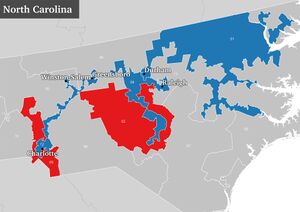How Bad is the Electoral College?

The Electoral College is an excellent tool for wasting millions of votes.
As of today with most of the votes counted, most news outlets declaring Biden the winner and with Biden earning more than 4 million plus in the popular vote contest (this figure is over 7 million now 4/19/23), Trump still has a path to winning the Electoral College.
It has nothing to do with "voter fraud" or counting the votes, it has everything to do with manipulating the Electoral College and gerrymandering also plays a big part.
Here's how he could do it:
First let's look at what the Constitution says about how states pick their Electors: From Article II, Section 1, Clauses 2 and 3 Each State shall appoint, in such Manner as the Legislature thereof may direct, a Number of Electors, equal to the whole Number of Senators and Representatives to which the State may be entitled in the Congress.
You might notice that it says nothing about an election, or winning the popular vote in the respective state. It gives the state legislatures the complete power to select and appoint Electors.
That brings us to Pennsylvania, Georgia and Arizona all states with Republican legislatures. You can see where this is going: Trump shouts "VOTER FRAUD, VOTER FRAUD" and his unquestioning followers repeat it and start putting pressure on the Republican dominated legislatures in these now critical states, who are already open to Trump's wild claims. So the Republican legislatures throw out the popular vote for whatever reason they invent; it doesn't matter, the Constitution grants them complete power to pick the Electors of their choosing.
How likely is this? From what I gather not very likely, however the legal path is there in plain sight and the point is not if it will happen, but could it happen. The biggest hurdle would be the Pennsylvania legislature, it is Republican dominated through gerrymandering even after the Blue Wave of 2018. Also its' result will end up past the margin of recount and its' margin of Electors would put Biden past 270 without the other two. These Republicans might not be very sympathetic to Trump because they are probably more preoccupied with state concerns and might actual be ready to get rid of the Trump circus. However the amount of Republican pressure Trump can put on these people should not be underestimated. Remember they are in carefully gerrymandered districts, so whoever wins the primary will generally win. So he could threaten to have them primaried. That would be the stick, on the other hand promising more, taxing the "Blue States to give to the Red States" (as happened with the PPP, the farm bailout and probably a number of other things that don't come to mind at the moment) would be the carrot.
The question is how would the SCOTUS view a state legislature which promises one way of selecting their Electors then turning around when they don't like the outcome and choosing a different way. Considering that 6 out of 3 of the judges are what I would call "anti-democratic" (most people call them conservative but I think "anti-democratic" is a more accurate description), I think they would be receptive to rubber stamping it. The most doubtful 3 in my mind would be Roberts (because he doesn't like to rock the boat too much), Barrett (simply because she is an unknown and in the tradition of conservative judges she won't recuse herself), and Kavanaugh (because I've seen some signs of him wanting to stick to precedent). If I can imagine it, Trump's circle can imagine it.
Just a short aside on gerrymandering; because it uses the same anti-democratic building blocks as the Electoral College, that of vote wasting and voter suppression. Vote wasting works like this: say a hypothetical state votes 53% Democratic, 41% Republican and 6% other party, but the resulting legislature ends up being 60% Republican and 40% Democratic. Of course all of the 6% other party are wasted because most states have a winner-take-all Electoral System rather than a Ranked Choice or Single Transferable Vote system, but how do 32% of the democratic votes end up being wasted. The answer is; carefully designed redistricting based on the fact that the vast majority of peoples' voting patterns are very predictable. If a Democrat is assigned a district in which they will win by a large margin, like 80% to 20% that takes votes out of a Republican designated district which they are designed to win 55% to 45%. This allows a majority of legislators to be elected from a minority party or to gain a super majority even when none exists in the state's voters. the larger the state the more effect this strategy is, and Pennsylvania is a very large state. Voter suppression in Republican designated districts would consist of building various hurdles to easy voting; reducing the number of polling place, requiring voter ID then making ID more difficult to get, restricting mail-in ballots, etc, etc.
This issue of partisan vote wasting was brought to the SCOTUS while Kennedy was still a judge there and indicated he was receptive to the idea that partisan gerrymandering was a problem, and in conflict with the "one person, one vote" ideal. However, when actual evidence showing the math behind vote wasting was presented to him and the other 4 anti-democratic judges they essentially gave their rubber-stamp to states using partisan gerrymandering. The only gerrymandering they are concerned about is racial gerrymandering. So as long as a state doesn't mention race while drawing their maps they are completely okay, even if the net effect of those gerrymanders are that the majority of minorities live in districts where their votes are wasted.
